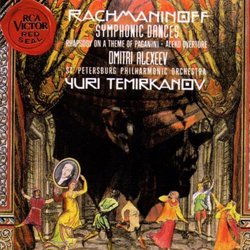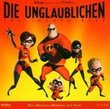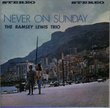| All Artists: Sergey Rachmaninov, Yuri Temirkanov, St. Petersburg Philharmonic Orchestra, Dmitri Alexeev Title: Rachmaninov: Symphonic Dances, Rhapsody on a Theme of Paganini, Aleko Overture Members Wishing: 0 Total Copies: 0 Label: RCA Release Date: 1/10/1995 Genres: Dance & Electronic, Classical Styles: Opera & Classical Vocal, Forms & Genres, Concertos, Historical Periods, Modern, 20th, & 21st Century, Instruments, Keyboard, Symphonies Number of Discs: 1 SwapaCD Credits: 1 UPC: 090266271023 |
Search - Sergey Rachmaninov, Yuri Temirkanov, St. Petersburg Philharmonic Orchestra :: Rachmaninov: Symphonic Dances, Rhapsody on a Theme of Paganini, Aleko Overture
CD DetailsSimilar CDs
|
CD ReviewsThe Symphonic Dances are a revelation! Keith Peters | 10/20/2000 (5 out of 5 stars) "Like most people, I'm familiar with Rachmaninoff's two big concerti,(the 2nd and 3rd), the second Symphony, the Paganini Rhapsody and some of the piano works. But I had no idea that his penultimate composition, the Symphonic Dances was so good. This performance by Yuri Temirkanov and the St. Petersburg Philharmonic Orchestra proves it. The beautifully written liner notes by Steven Ledbetter also tell the poignant story behind the composition of Symphonic Dances (dedicated, by the way to Eugene Ormandy and the Philadelphia Orchestra) The recording, by veteran Red Seal producer Jay David Saks is incredible, making the recent decision by BMG to drastically cut their classical product especially regretable. With great recordings like this coming from this source, I hope BMG reverses their decision. Even if you don't care for Rachmaninoff, I would urge you to get this recording. You won't regret it." Brilliant Sound and Great Passion Classicalfan | Reston, VA USA | 01/16/2006 (5 out of 5 stars) "This is an excellent digital successor to Kiril Kondrashin's outstanding 1963 analog recording. The first time I heard The Symphonic Dances was the recording by Kondrashin and the Moscow State Symphony Orchestra. I listened to it over and over again, carried to the heights of musical ecstasy by his fiery interpretation brimming over with passion. I then heard Ashkenazy's versions and Janson's. They were not as good. But now, I've heard this magnificent recording. I still hold a preference for Kondrashin, who brings out with tremendous intensity all of the passion in this work. But there is also lyricism, poetry, and tenderness in the slow passages of this composition. In bringing out these qualities, Temirkanov and the St. Petersburg Philharmonic Orchestra excel and are as wonderful as Kondrashin. As for the faster and louder passages, the ones that make me think of horsemen charging through the snow, if they don't quite equal the burning intensity of Kondrashin's version, they come fairly close. When one adds the fact that this recording was made in 1992 in crisp, clear, 20-bit digital, where you can hear the finely etched detail of the sound of the saxophone, the English horn, the clarinets, bassoons, trumpets, violins, and booming drums with outstanding clarity, it's a great musical joy to experience. In comparison, the sound of the 1963 remastered analog recording by Kondrashin, while it is quite good, just doesn't have quite the same level of clarity as this recording. Two extra bonuses are the brief but beautiful Aleko overture that begins this CD and the Rhapsody on a Theme of Paganini. Until now, I have sworn by the 1956 recording by Rubinstein, with Fritz Reiner and the Chicago Symphony Orchestra. I still like, even love that recording. But I absolutely adore this one. Dimitri Alexeev is clearly a gifted pianist and he gives a performance that would probably move Rachmaninov himself, much as Horowitz's performance of his Second Piano Concerto did in fact move him when he was alive. Not only are Temirkanov, Alexeev, and the St. Petersburg Philharmonic all wonderful as they perform this composition with sublime subtlety and consummate virtuoso technique, but the very clear digital sound brings out details and nuances in this performance that are not as apparent or striking on the 1956 Rubinstein/Reiner recording. Just one example: Variation 17, just before the famous Variation 18. The horns come in with a long, slow, mournful note; then, the violins appear and disappear, rise and fall, retreat and return, playing a tremelo that is at once delicate yet tense, brooding, expectant, exciting, like the rising and falling tides of the sea, yet so delicate that the sound is also like the fluttering wings of a hummingbird. In the Rubinstein/Reiner recording, the horns and violins in the 17th Variation are there also, but further in the background, having a subdued fuzzy sound in comparison to the Alexeev/Termirkanov recording. Hence, the impact is not nearly as powerful on the older recording. In fact, it was only on hearing this CD that the beauty of this passage first struck me. Only then did I go back to the Rubinstein/Reiner CD, wondering how I could have missed it when I listened to it so many times. Of course, when I listened to the Rubinstein/Reiner recording, I realized why this passage had never moved or impressed me before - there is only so much that can be done in the CD remastering process, even with the best sound engineering in the world, with a 1956 recording. The Alexeev/Temirkanov recording was made 36 years later, in 1992. First rate modern recording technology, the excellent acoustics of London's Blackheath Concert Hall, an outstanding Russian conductor and Russian orchestra, with a brilliant Russian pianist, all rendering homage with their musical heart and soul to a great Russian composer, showing their devotion to and love for his music - what more could one ask for? Just when you think it couldn't get any better, there is an extra bit of icing put on the cake: a very nice CD insert that is well-written, detailed, interesting and informative. As the reviewer Keith Peters very rightly points out below, the liner notes by Steven Ledbetter are beautifully written and the story they tell of the composition of the Symphonic Dances is indeed poignant. This is a wonderful CD. Very Highly Recommended." Compassion for Passion: Rachmaninov and Temirkanov Grady Harp | Los Angeles, CA United States | 04/01/2005 (5 out of 5 stars) "Hold on to your seats! This recording of the Rachmaninov SYMPHONIC DANCES is passionate and breathtakingly performed by Yuri Temirkanov and his St Petersberg Philharmonic Orchestra. Though many critics have dismissed the works of Rachmaninov as mundane and adding little to the musical growth of the 20th century, and especially relegating the Symphonic Dances as the prime example of his 'empty music', the impact of Rachmaninov's works on audiences remains sustainably strong. His symphonies and piano concerti are standard repertoire with every orchestra, (the inimitable melodies within these works are part of our brain functioning!) and time is proving that his 'Symphonic Dances' is one of his strongest works. If ever there were a case for this thesis it is in this remarkable recording.
Not to dismiss the other works on this CD (the rarely performed overture to 'Aleko' and the "Rhapsody on a Theme of Paganini" here performed with great feeling and agility by Dmitri Alexeyev), but the album title is there for a reason. Temirkanov swoops into the Dances with such lust and vigor and then draws out the long lines of string sensuality to such an extent that the mood is nearly unbearable. This is without a doubt the finest recording of the Symphonic Dances available! Grady Harp, April 05" |


 Track Listings (29) - Disc #1
Track Listings (29) - Disc #1

